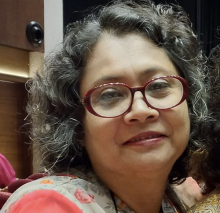A talk by Mirza Taslima, Professor of Anthropology at Jahangirnagar University, Bangladesh.
Anirban Gupta-Nigam, Associate Director, Institute for South Asia Studies, will serve as discussant.
Event moderated by Elora Shehabuddin, Professor of Gender & Women’s Studies and Global Studies and Director, Subir and Malini Chowdhury Center for Bangladesh Studies, UC Berkeley
_______________
- DATE: Fri, Apr 12, 2024
- TIME: 5-6:30 pm PST
- VENUE: 10 Stephens Hall
- LIVESTREAM: On FB at ChowdhuryCenter atUCBerkeley
___________
Abstract
The subject of discussion is the researcher’s most current investigation into trolling in Bangladesh. As the nation’s usage of the internet and social media has grown, so has trolling. The number of people trolling celebs and politicians as well as regular people is rising. Bullying and hate speech were prevalent in public areas, including streets, workplaces, and educational facilities. Nonetheless, the situation is quite concerning due to hate speech that is encouraged online. From 2013 to 2016, 30 bloggers and on 25 April 2016, 2 LGBTQ persons were killed. According to Parsa Sanjana Sajid (2020) LGBTQ communities and sex workers initially found the social media spaces liberating but soon found it to be a dangerous terrain because of these killings. LGBTQ peoples, Sex workers and the bloggers were trolled with receiving death and rape threats.Thus, the researcher explores the beginnings online trolling in this talk and identifies many types of trolling through social media research as well as interviewing the individuals who experienced troll, such as trolling that is sponsored by the state (Nyst and Monaco, 2018), trolling that is motivated by gender, and trolling that is based on ethnicity. The study argues that In the post-truth context (Hannan,2018) of Bangladesh the religious extremists threaten the bloggers or it involves gendertrolling (Mantilla, 2013) of celebrities or trolling by bots to the groups raising dissenting voices, all are affecting the formation of public opinion in the cyberspace of Bangladeshi netizens. While the trolls are active in shaping the cyberspace, and the public space according to their respective goals, the research findings are similar to Lacy and Mookherjee’s (2020) study, that is currently in Bangladesh the head of the government could not be trolled on social media and for this many were arrested under the Information and communication Technology act (2006) and Digital Security Act (2018); though in 2023, a new law, Cyber Security Act was employed, those who faced the charges under the previous acts have been facing the trials, sometimes without the specific police charges. The study finds that Bangladeshi individuals are unable to exercise their constitutionally guaranteed freedoms in cyberspace, and in order to silence their voices, prevalent standards are replicated there and expanded to include a wide range of infractions.
About the Speaker
Mirza Taslima is Professor of Anthropology at Jahangirnagar University, Bangladesh. She is currently a Fulbright Visiting Scholar in the Department of Gender and Women Studies at UC Berkeley. Her research focuses on gender-based trolling, in which she aims to compare the ethnography of trolled people and their agencies between Bangladesh and US contexts. She is conducting an interdisciplinary study in this project to theorize on the formation of the public in cyberspace of Bangladesh and the US and to consider the various expressions of democracy and civil rights. She did her field research in Bangladesh and now is establishing contacts to conduct interviews in the US context.
Dr. Mirza Taslima did her Ph.D. on Childlessness and IVF in Bangladesh at the Center for Gender and Women Studies in Lancaster University, UK.
_____________
Established in 2013 with a generous gift from the Subir & Malini Chowdhury Foundation, The Subir & Malini Chowdhury Center for Bangladesh Studies at UC Berkeley champions the study of Bangladesh’s cultures, peoples and history. The first of its kind in the US, the Center’s mission is to create an innovative model combining research, scholarships, the promotion of art and culture, and the building of ties between institutions in Bangladesh and the University of California.
Like us on FACEBOOK
For DIRECTIONS to the Institute please enter “Institute for South Asia Studies” in your google maps or click this GOOGLE MAPS LINK.
PARKING INFORMATION
Please note that parking is not always easily available in Berkeley. Take public transportation if possible or arrive early to secure your spot.
Event is FREE and OPEN to the public.

